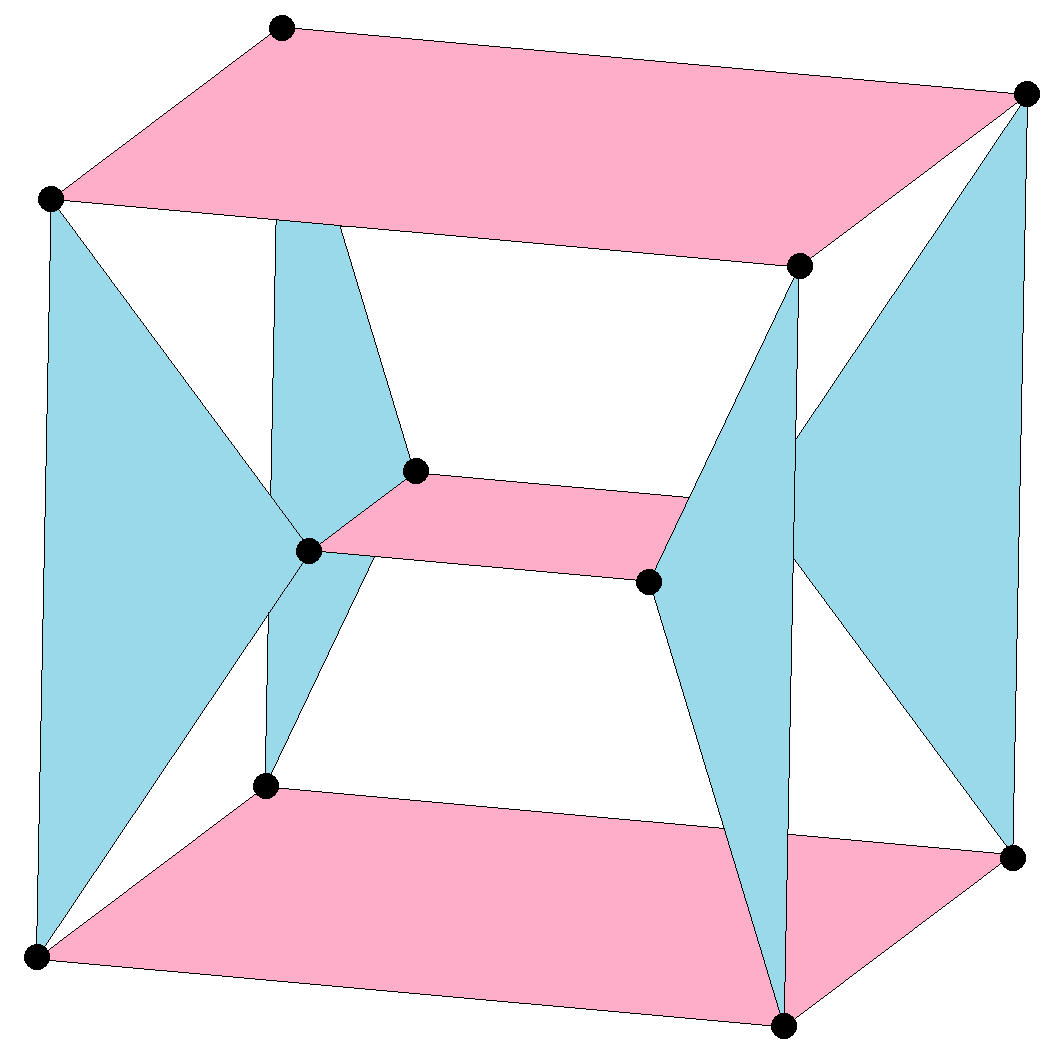4-3 Duoprism on:
[Wikipedia]
[Google]
[Amazon]
In
 The quasiregular
The quasiregular

The Fourth Dimension Simply Explained
mdash;describes duoprisms as "double prisms" and duocylinders as "double cylinders"
- glossary of higher-dimensional terms
Exploring Hyperspace with the Geometric Product
4-polytopes
geometry
Geometry (; ) is, with arithmetic, one of the oldest branches of mathematics. It is concerned with properties of space such as the distance, shape, size, and relative position of figures. A mathematician who works in the field of geometry is c ...
of 4 dimensions, a 3-4 duoprism, the second smallest p-q duoprism, is a 4-polytope
In geometry, a 4-polytope (sometimes also called a polychoron, polycell, or polyhedroid) is a four-dimensional polytope. It is a connected and closed figure, composed of lower-dimensional polytopal elements: vertices, edges, faces (polygons), an ...
resulting from the Cartesian product
In mathematics, specifically set theory, the Cartesian product of two sets ''A'' and ''B'', denoted ''A''×''B'', is the set of all ordered pairs where ''a'' is in ''A'' and ''b'' is in ''B''. In terms of set-builder notation, that is
: A\ti ...
of a triangle
A triangle is a polygon with three Edge (geometry), edges and three Vertex (geometry), vertices. It is one of the basic shapes in geometry. A triangle with vertices ''A'', ''B'', and ''C'' is denoted \triangle ABC.
In Euclidean geometry, an ...
and a square.
The ''3-4 duoprism'' exists in some of the uniform 5-polytopes in the B5 family.
Images
Related complex polygons
 The quasiregular
The quasiregular complex polytope In geometry, a complex polytope is a generalization of a polytope in real space to an analogous structure in a complex Hilbert space, where each real dimension is accompanied by an imaginary one.
A complex polytope may be understood as a collecti ...
3×4, , in has a real representation as a 3-4 duoprism in 4-dimensional space. It has 12 vertices, and 4 3-edges and 3 4-edges. Its symmetry is 3 sub>4, order 12. Coxeter, H. S. M.; ''Regular Complex Polytopes'', Cambridge University Press, (1974).
Related polytopes
The birectified 5-cube, has a uniform 3-4 duoprismvertex figure
In geometry, a vertex figure, broadly speaking, is the figure exposed when a corner of a polyhedron or polytope is sliced off.
Definitions
Take some corner or Vertex (geometry), vertex of a polyhedron. Mark a point somewhere along each connect ...
:
:
3-4 duopyramid
The dual of a ''3-4 duoprism'' is called a 3-4duopyramid
In geometry of 4 dimensions or higher, a double pyramid or duopyramid or fusil is a polytope constructed by 2 orthogonal polytopes with edges connecting all pairs of vertices between the two. The term fusil is used by Norman Johnson as a rhom ...
. It has 12 digonal disphenoid
In geometry, a tetrahedron (plural: tetrahedra or tetrahedrons), also known as a triangular pyramid, is a polyhedron composed of four triangular faces, six straight edges, and four vertex corners. The tetrahedron is the simplest of all the o ...
cells, 24 isosceles triangular faces, 12 edges, and 7 vertices.
See also
* Polytope and polychoron * Convex regular polychoron * Duocylinder * TesseractNotes
References
*''Regular Polytopes'',H. S. M. Coxeter
Harold Scott MacDonald "Donald" Coxeter, (9 February 1907 – 31 March 2003) was a British and later also Canadian geometer. He is regarded as one of the greatest geometers of the 20th century.
Biography
Coxeter was born in Kensington t ...
, Dover Publications, Inc., 1973, New York, p. 124.
* Coxeter, ''The Beauty of Geometry: Twelve Essays'', Dover Publications, 1999, (Chapter 5: Regular Skew Polyhedra in three and four dimensions and their topological analogues)
** Coxeter, H. S. M. ''Regular Skew Polyhedra in Three and Four Dimensions.'' Proc. London Math. Soc. 43, 33–62, 1937.
* John H. Conway
John Horton Conway (26 December 1937 – 11 April 2020) was an English people, English mathematician active in the theory of finite groups, knot theory, number theory, combinatorial game theory and coding theory. He also made contributions to ...
, Heidi Burgiel, Chaim Goodman-Strass, ''The Symmetries of Things'' 2008, (Chapter 26)
* Norman Johnson ''Uniform Polytopes'', Manuscript (1991)
** N.W. Johnson: ''The Theory of Uniform Polytopes and Honeycombs'', Ph.D. Dissertation, University of Toronto, 1966
* {{PolyCell , urlname =section6.html, title = Catalogue of Convex Polychora, section 6
External links
The Fourth Dimension Simply Explained
mdash;describes duoprisms as "double prisms" and duocylinders as "double cylinders"
- glossary of higher-dimensional terms
Exploring Hyperspace with the Geometric Product
4-polytopes